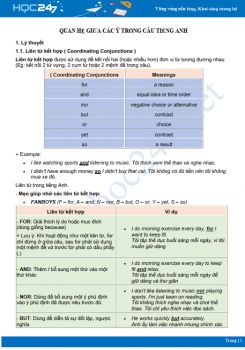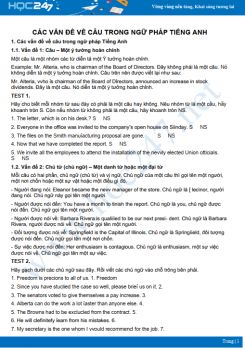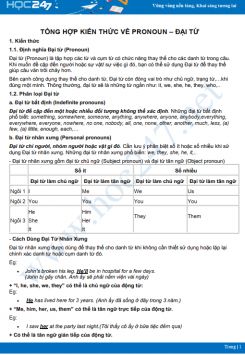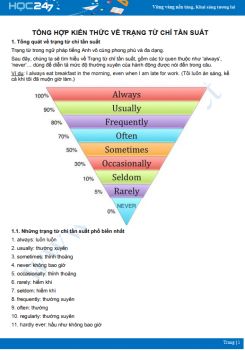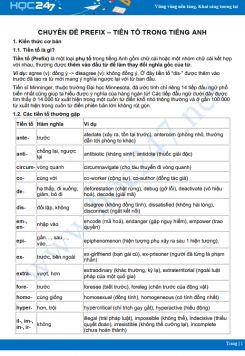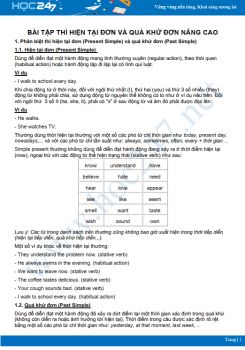Vß╗øi mong muß╗æn gi├║p c├Īc em hß╗Źc sinh lß╗øp 10 c├│ th├¬m t├Āi liß╗ću ├┤n tß║Łp vß╗ü nß╗Öi dung kiß║┐n thß╗®c vß╗ü c├óu phß╗®c hß╗Żp v├Ā ─æß║Īi tß╗½ quan hß╗ć trong Tiß║┐ng Anh, HOC247 xin giß╗øi thiß╗ću ─æß║┐n c├Īc em t├Āi liß╗ću C├óu phß╗®c hß╗Żp v├Ā ─æß║Īi tß╗½ quan hß╗ć trong Tiß║┐ng Anh gß╗ōm phß║¦n l├Į thuyß║┐t v├Ā b├Āi tß║Łp k├©m ─æ├Īp ├Īn giß║Żi chi tiß║┐t, gi├║p c├Īc em ├┤n tß║Łp, r├©n luyß╗ćn k─® n─āng l├Ām ─æß╗ü. Mß╗Øi c├Īc em c├╣ng tham khß║Żo. Ch├║c c├Īc em ─æß║Īt kß║┐t quß║Ż hß╗Źc tß║Łp tß╗æt.
C├éU PHß╗©C Hß╗óP V├Ć ─Éß║ĀI Tß╗¬ QUAN Hß╗å TRONG TIß║ŠNG ANH
1. Hß╗ć thß╗æng kiß║┐n thß╗®c
1.1. C├óu phß╗®c hß╗Żp v├Ā ─æß║Īi tß╗½ quan hß╗ć
Tiß║┐ng Anh c├│ 2 loß║Īi c├óu:
- C├óu ─æŲĪn giß║Żn: l├Ā c├óu c├│ 1 th├Ānh phß║¦n v├Ā chß╗ē cß║¦n nhŲ░ vß║Ły c├óu c┼®ng ─æ├Ż ─æß╗¦ ngh─®a.
- C├óu phß╗®c hß╗Żp: l├Ā loß║Īi c├óu c├│ 2 th├Ānh phß║¦n (2 mß╗ćnh ─æß╗ü) ch├Łnh/phß╗ź nß╗æi vß╗øi nhau bß║▒ng mß╗Öt tß╗½ gß╗Źi l├Ā ─æß║Īi tß╗½ quan hß╗ć.
a. That v├Ā Which l├Ām chß╗¦ ngß╗» cß╗¦a mß╗ćnh ─æß╗ü phß╗ź
N├│ ─æß╗®ng ─æß║¦u c├óu phß╗ź, thay thß║┐ cho danh tß╗½ bß║źt ─æß╗Öng ─æß╗®ng trŲ░ß╗øc n├│ v├Ā ─æ├│ng vai tr├▓ chß╗¦ ngß╗» cß╗¦a c├óu phß╗ź. Trong trŲ░ß╗Øng hß╗Żp n├Āy kh├┤ng thß╗ā lŲ░ß╗Żc bß╗Å that hoß║Ęc which:
We bought the stereo that had been advertised at a reduced price.
(We bought the stereo. It had been advertised at a reduced price)
b. That v├Ā Which l├Ām t├ón ngß╗» cß╗¦a mß╗ćnh ─æß╗ü phß╗ź
N├│ thay thß║┐ cho danh tß╗½ bß║źt ─æß╗Öng ─æß╗®ng trŲ░ß╗øc n├│, mß╗¤ ─æß║¦u c├óu phß╗ź nhŲ░ng ─æ├│ng vai tr├▓ t├ón ngß╗» trong c├óu phß╗ź. Trong trŲ░ß╗Øng hß╗Żp n├Āy c├│ thß╗ā lŲ░ß╗Żc bß╗Å that hoß║Ęc which:
George is going to buy the house (that) we have been thinking of buying.
(George is going to buy a house. We have been thinking of buying it).
NgŲ░ß╗Øi ta d├╣ng that chß╗® kh├┤ng d├╣ng which khi:
─Éß╗®ng trŲ░ß╗øc n├│ l├Ā mß╗Öt t├Łnh tß╗½ so s├Īnh bß║Łc nhß║źt + danh tß╗½
That is the best novel that has been written by this author.
Khi ─æß║▒ng trŲ░ß╗øc n├│ l├Ā mß╗Öt sß╗æ c├Īc ─æß║Īi tß╗½ phiß║┐m chß╗ē nhŲ░ all, some, any, anything, everything, much, little, nothing v.v..
I want to see all that he possesses.
All the apples that fall are eaten by pig.
c. Who l├Ām chß╗¦ ngß╗» cß╗¦a mß╗ćnh ─æß╗ü phß╗ź
N├│ thay thß║┐ cho danh tß╗½ chß╗ē ngŲ░ß╗Øi hoß║Ęc ─æß╗Öng vß║Łt ─æß╗®ng trŲ░ß╗øc n├│ v├Ā ─æ├│ng vai tr├▓ chß╗¦ ngß╗» cß╗¦a c├óu phß╗ź. Trong trŲ░ß╗Øng hß╗Żp n├Āy kh├┤ng thß╗ā lŲ░ß╗Żc bß╗Å who:
The man who is in this room is angry.
d. Whom l├Ām t├ón ngß╗» cß╗¦a mß╗ćnh ─æß╗ü phß╗ź
N├│ thay thß║┐ cho danh tß╗½ chß╗ē ngŲ░ß╗Øi hoß║Ęc ─æß╗Öng vß║Łt (─æß╗Öng vß║Łt nu├┤i trong nh├Ā) ─æß╗®ng trŲ░ß╗øc n├│ v├Ā ─æ├│ng tr├▓ t├ón ngß╗» cß╗¦a c├óu phß╗ź; n├│ c├│ thß╗ā bß╗Å ─æi ─æŲ░ß╗Żc.
The men (whom) I donŌĆÖt like are angry.
Nß║┐u whom l├Ām t├ón ngß╗» cß╗¦a mß╗Öt ngß╗» ─æß╗Öng tß╗½ bao gß╗ōm 1 Verb + 1 giß╗øi tß╗½ th├¼ lß╗æi viß║┐t chuß║®n nhß║źt l├Ā ─æŲ░a giß╗øi tß╗½ ─æ├│ l├¬n trŲ░ß╗øc whom.
The man to whom you have just talked is the chairman of the company.
Tuy nhi├¬n nß║┐u whom l├Ā t├ón ngß╗» cß╗¦a mß╗Öt ngß╗» ─æß╗Öng tß╗½ bao gß╗ōm 1 ─æß╗Öng tß╗½ + 2 giß╗øi tß╗½ th├¼ 2 giß╗øi tß╗½ ─æ├│ vß║½n phß║Żi ─æß╗®ng ─æß║▒ng sau ─æß╗Öng tß╗½.
The man whom you are looking forward to is the chairman of the company.
Kh├┤ng ─æŲ░ß╗Żc d├╣ng who thay cho whom trong v─ān viß║┐t d├╣ n├│ ─æŲ░ß╗Żc chß║źp nhß║Łn trong v─ān n├│i.
1.2. Mß╗ćnh ─æß╗ü phß╗ź bß║»t buß╗Öc v├Ā kh├┤ng bß║»t buß╗Öc
a. Mß╗ćnh ─æß╗ü phß╗ź bß║»t buß╗Öc
L├Ā loß║Īi mß╗ćnh ─æß╗ü bß║»t buß╗Öc phß║Żi c├│ mß║Ęt ß╗¤ trong c├óu, nß║┐u bß╗Å ─æi c├óu sß║Į mß║źt ├Į ngh─®a ban ─æß║¦u. N├¬n d├╣ng that l├Ām chß╗¦ ngß╗» cho loß║Īi c├óu n├Āy mß║Ęc d├╣ which vß║½n ─æŲ░ß╗Żc chß║źp nhß║Łn. C├óu phß╗ź thŲ░ß╗Øng ─æß╗®ng xen v├Āo giß╗»a c├óu ch├Łnh hoß║Ęc nß╗æi liß╗ün vß╗øi c├óu ch├Łnh v├Ā kh├┤ng t├Īch rß╗Øi khß╗Åi n├│ bß╗¤i bß║źt cß╗® dß║źu phß║Ży n├Āo. Trong v├Ł dß╗ź sau nß║┐u bß╗Å ─æi mß╗ćnh ─æß╗ü phß╗ź ─æŲ░ß╗Żc gß║Īch ch├ón th├¼ c├óu sß║Į mang ├Į ngh─®a ho├Ān to├Ān kh├Īc:
Weeds that float to the surface should be removed before they decay.
b. Mß╗ćnh ─æß╗ü phß╗ź kh├┤ng bß║»t buß╗Öc
L├Ā loß║Īi mß╗ćnh ─æß╗ü mang th├┤ng tin phß╗ź trong c├óu, nß║┐u bß╗Å n├│ ─æi c├óu kh├┤ng mß║źt ngh─®a ban ─æß║¦u. Kh├┤ng ─æŲ░ß╗Żc d├╣ng that l├Ām chß╗¦ ngß╗» m├Ā phß║Żi d├╣ng which, cho d├╣ which c├│ l├Ā t├ón ngß╗» cß╗¦a mß╗ćnh ─æß╗ü phß╗ź c┼®ng kh├┤ng ─æŲ░ß╗Żc ph├®p bß╗Å n├│ ─æi. C├óu phß╗ź thŲ░ß╗Øng ─æß╗®ng chen v├Āo giß╗»a c├óu ch├Łnh v├Ā bß║»t buß╗Öc phß║Żi t├Īch khß╗Åi c├óu ch├Łnh bß║▒ng 2 dß║źu phß║®y. X├®t hai v├Ł dß╗ź sau:
My car, which is very large, uses too much gasoline.
This rum, which I bought in the Virgin Islands, is very smooth.
c. Tß║¦m quan trß╗Źng cß╗¦a viß╗ćc sß╗Ł dß╗źng dß║źu phß║®y ─æß╗æi vß╗øi mß╗ćnh ─æß╗ü phß╗ź
ß╗× nhß╗»ng mß╗ćnh ─æß╗ü phß╗ź bß║»t buß╗Öc, khi kh├┤ng d├╣ng dß║źu phß║®y tß╗®c l├Ā mß╗ćnh ─æß╗ü phß╗ź x├Īc ─æß╗ŗnh mß╗Öt giß╗øi hß║Īn ─æß╗æi vß╗øi danh tß╗½ ─æß║▒ng trŲ░ß╗øc trong mß╗ćnh ─æß╗ü ch├Łnh
The travelers who knew about the flood took another road. (Nhß╗»ng ngŲ░ß╗Øi biß║┐t vß╗ü trß║Łn l┼® ─æß╗üu chß╗Źn ─æŲ░ß╗Øng kh├Īc)
The wine that was stored in the cellar was ruined.
─Éß╗æi vß╗øi nhß╗»ng mß╗ćnh ─æß╗ü phß╗ź kh├┤ng bß║»t buß╗Öc, khi c├│ dß║źu phß║®y ng─ān c├Īch th├¼ n├│ kh├┤ng x├Īc ─æß╗ŗnh giß╗øi hß║Īn ─æß╗æi vß╗øi danh tß╗½ ─æß╗®ng trŲ░ß╗øc n├│.
The travelers, who knew about the flood, took another road. (Tß║źt cß║Ż nhß╗»ng ngŲ░ß╗ØiŌĆ”)
The wine, which was stored in the cellar, was ruined.
Note: C├Īc nguy├¬n tß║»c tr├¬n ─æ├óy chß╗ē d├╣ng trong v─ān viß║┐t, kh├┤ng d├╣ng trong v─ān n├│i. Lß╗Śi ngß╗» ph├Īp cß╗¦a TOEFL kh├┤ng t├Łnh ─æß║┐n mß╗ćnh ─æß╗ü phß╗ź bß║»t buß╗Öc nhŲ░ng sß║Į trß╗½ ─æiß╗ām nß║┐u phß║Īm phß║Żi lß╗Śi mß╗ćnh ─æß╗ü phß╗ź kh├┤ng bß║»t buß╗Öc.
1.3. C├Īch sß╗Ł dß╗źng All, Both, Some, Several, Most, Few + Of + Whom/ Which
Her sons, both of whom are working abroad, call her every week. (kh├┤ng ─æŲ░ß╗Żc n├│i both of them)
The buses, most of which were full of passengers, began to pull out.
Tuyß╗ćt ─æß╗æi kh├┤ng ─æŲ░ß╗Żc d├╣ng ─æß║Īi tß╗½ nh├ón xŲ░ng t├ón ngß╗»: them, us trong trŲ░ß╗Øng hß╗Żp n├Āy.
What (the things that) c├│ thß╗ā l├Ām t├ón ngß╗» cho mß╗ćnh ─æß╗ü phß╗ź c├╣ng l├║c l├Ām chß╗¦ ngß╗» cho mß╗ćnh ─æß╗ü ch├Łnh/ hoß║Ęc l├Ām chß╗¦ ngß╗» cß╗¦a cß║Ż 2 mß╗ćnh ─æß╗ü ch├Łnh, phß╗ź:
What we have expected is the result of the test.
What happened to him yesterday might happen to us tomorrow.
Whose (cß╗¦a ngŲ░ß╗Øi m├Ā, cß╗¦a con m├Ā) c├│ thß╗ā thay thß║┐ cho danh tß╗½ chß╗ē ngŲ░ß╗Øi hoß║Ęc ─æß╗Öng vß║Łt ß╗¤ trŲ░ß╗øc n├│ v├Ā chß╗ē sß╗▒ sß╗¤ hß╗»u cß╗¦a ngŲ░ß╗Øi hoß║Ęc ─æß╗Öng vß║Łt ─æ├│ ─æß╗æi vß╗øi danh tß╗½ ─æi sau.
James, whose father is the president of the company, has received a promotion.
Trong lß╗æi v─ān viß║┐t trang trß╗Źng n├¬n d├╣ng of which ─æß╗ā thay thß║┐ cho danh tß╗½ bß║źt ─æß╗Öng mß║Ęc d├╣ whose vß║½n ─æŲ░ß╗Żc chß║źp nhß║Łn.
Savings account, of which interest rate is quite hight, is very common now. (of which = whose).
Hoß║Ęc d├╣ng with + noun/ noun phrase thay cho whose.
A house whose walls were made of glass is easy to break = A house with glass walls is easyto break.
1.4. C├Īch loß║Īi bß╗Å ─æß║Īi tß╗½ quan hß╗ć trong mß╗ćnh ─æß╗ü phß╗ź
─Éß╗æi vß╗øi nhß╗»ng mß╗ćnh ─æß╗ü phß╗ź bß║»t buß╗Öc ngŲ░ß╗Øi ta c├│ thß╗ā (kh├┤ng bß║»t buß╗Öc) loß║Īi bß╗Å ─æß║Īi tß╗½ quan hß╗ć v├Ā ─æß╗Öng tß╗½ to be (c├╣ng vß╗øi c├Īc trß╗Ż ─æß╗Öng tß╗½ cß╗¦a n├│) trong mß╗Öt sß╗æ trŲ░ß╗Øng hß╗Żp sau:
a. TrŲ░ß╗øc mß╗Öt mß╗ćnh ─æß╗ü phß╗ź m├Ā cß║źu tr├║c ─æß╗Öng tß╗½ ß╗¤ thß╗Øi bß╗ŗ ─æß╗Öng.
This is the value of X (which was) obtained from the areas under the normal curve.
b. TrŲ░ß╗øc mß╗Öt mß╗ćnh ─æß╗ü phß╗ź m├Ā sau n├│ l├Ā mß╗Öt ngß╗» giß╗øi tß╗½.
The beaker (that is) on the counter contains a solution.
c. TrŲ░ß╗øc mß╗Öt cß║źu tr├║c ─æß╗Öng tß╗½ ß╗¤ thß╗ā tiß║┐p diß╗ģn.
The girl (who is) running down the street might be in trouble.
Ngo├Āi ra trong mß╗Öt sß╗æ trŲ░ß╗Øng hß╗Żp khi ─æß║Īi tß╗½ quan hß╗ć trong mß╗ćnh ─æß╗ü phß╗ź bß║»t buß╗Öc gß║»n liß╗ün vß╗øi chß╗¦ ngß╗» ─æß╗®ng trŲ░ß╗øc n├│ v├Ā mß╗ćnh ─æß╗ü phß╗ź ß║źy diß╗ģn ─æß║Īt qui luß║Łt cß╗¦a sß╗▒ kiß╗ćn, ngŲ░ß╗Øi ta c├│ thß╗ā bß╗Å ─æß║Īi tß╗½ quan hß╗ć v├Ā ─æß╗Öng tß╗½ ch├Łnh ─æß╗ā thay v├Āo ─æ├│ bß║▒ng mß╗Öt Verb-ing.
The travelers taking (who take) this bus on a daily basis buy their ticket in booking.
Trong nhß╗»ng mß╗ćnh ─æß╗ü phß╗ź kh├┤ng bß║»t buß╗Öc ngŲ░ß╗Øi ta c┼®ng c├│ thß╗ā loß║Īi bß╗Å ─æß║Īi tß╗½ quan hß╗ć v├Ā ─æß╗Öng tß╗½ to be khi n├│ ─æß╗®ng trŲ░ß╗øc mß╗Öt ngß╗» danh tß╗½. Tuy nhi├¬n phß║¦n ngß╗» danh tß╗½ c├▓n lß║Īi vß║½n phß║Żi ─æß╗®ng giß╗»a 2 dß║źu phß║®y.
Mr Jackson, (who is) a professor, is traveling in the Mideast this year.
Mß╗Öt trŲ░ß╗Øng hß╗Żp kh├Īc rß║źt phß╗Ģ biß║┐n l├Ā loß║Īi bß╗Å ─æß║Īi tß╗½ quan hß╗ć v├Ā ─æß╗Öng tß╗½ ch├Łnh, thay v├Āo ─æ├│ bß║▒ng mß╗Öt Verb-ing khi mß╗ćnh ─æß╗ü phß╗ź n├Āy bß╗Ģ ngh─®a cho mß╗Öt t├ón ngß╗».
The president made a speech for the famous man visiting (who visited) him.
2. B├Āi tß║Łp vß╗ü c├óu phß╗®c hß╗Żp
2.1. B├Āi tß║Łp 1: Viß║┐t lß║Īi nhß╗»ng c├óu sau m├Ā kh├┤ng l├Ām thay ─æß╗Ģi ngh─®a c├óu cß╗¦a n├│.
1. Service in this hotel ought to improve. ThereŌĆÖs been a change of management. (because)
= > Service in this hotel ought to improve because thereŌĆÖs been a change of management.
2. The Air Traffic Controllers are on strike. We have cancelled our holiday. (as)
3. Could you sell your old computer to me? You have no further.use for it. (seeing (that))
4. SheŌĆÖs never in when I phone. IŌĆÖll have to write to her. (since)
5. IŌĆÖve had to have the document translated. I canŌĆÖt read Russian. (since)
2.2. B├Āi tß║Łp 2: Ho├Ān th├Ānh c├óu bß║▒ng c├Īch sß╗Ł dß╗źng nhß╗»ng li├¬n tß╗½ ─æ├Ż cho.
1. ItŌĆÖs expensive. HeŌĆÖs determined to buy it. (however expensive)
= > However expensive it is, heŌĆÖs determined to buy it.
2. I work hard. I still have to take work home with me. (however hard)
3. You write well. It doesnŌĆÖt mean you will be published. (however well)
4. She feels sorry. The damage has been done. (no matter how sorry)
5. How much will they pay us? It will never compensate us. (no matter how much)
6. It doesnŌĆÖt matter how many cards I send. I always receive more. (no matter how many)
7. It doesnŌĆÖt matter what he tells you. DonŌĆÖt believe a word he says. (whatever)
2.3. B├Āi tß║Łp 3
1. IŌĆÖm going to buy a computer. I havenŌĆÖt got much money. (even though)
2. I intend to go for a walk this morning. ItŌĆÖs raining. (even if)
3. IŌĆÖd like to help you. IŌĆÖm afraid I wonŌĆÖt be able to. (much as)
4. Your design is excellent. It isnŌĆÖt suitable for our purposes. (while)
5. I try hard to play the piano. I donŌĆÖt seem to improve. (although)
6. Chinese is so difficult. ItŌĆÖs surprising how many people learn it. (considering that)
7. The play was wonderful. The film was a commercial failure. (whereas)
2.4. B├Āi tß║Łp 4: ─Éiß╗ün nhß╗»ng li├¬n tß╗½ sau v├Āo ├┤ trß╗æng trong ─æoß║Īn v─ān sau: as, because, even though, since, though, while
A SORT OF HUMANBURGER
(1) Even though itŌĆÖs difficult to find work these days, Joe Dobson has just given up his job. They were surprised when he announced this at the Job Centre (2)ŌĆ”after a lot of effort, they had found Joe a jab at a Hamburger Bar. (3)ŌĆ” Joe wasnŌĆÖt highly-qualified, this hadnŌĆÖt been easy. Yet Joe resigned, (4)ŌĆ” the job was easy and quite well-paid. ŌĆśWhat did you have to do for your money?ŌĆÖ the young woman at the Job Centre asked. ŌĆśStrange (5) ŌĆ” it sounds,ŌĆÖ Joe said, ŌĆśI had to dress up as a hamburger and stand outside the restaurant.ŌĆÖ ŌĆśA sort of humanburger?ŌĆÖ she suggested. ŌĆśThatŌĆÖs right,ŌĆÖ Joe said. ŌĆśI had to stand between the two round halves of a bun, (6) ŌĆ”I was ŌĆ£disguisedŌĆØ as the hamburger filling, covered in tomato sauce. The uniform was wonderful, (7) ŌĆ”I looked good enough to eat. The manager was pleased with me, (8) ŌĆ” I attracted a lot of customers.ŌĆÖ ŌĆśSo why did you give up, Joe?ŌĆÖ the young woman asked kindly. (9) ŌĆ” ŌĆÖ Joe said, his voice breaking slightly, ŌĆśstudents kept turning me on my side and rolling me down hill!ŌĆÖ
2.5. B├Āi tß║Łp 5: Viß║┐t lß║Īi c├óu ho├Ān chß╗ēnh vß╗øi li├¬n tß╗½ cho sß║Ąn:
1. I lost a lot of weight. I was ill. (when)
2. I phoned home. I arrived in the airport building. (immediately after)
3. 3 She had already opened the letter. She realized it wasnŌĆÖt addressed to her. (before)
4. The building had almost burnt down. The fire brigade arrived. (by the time)
5. We realized that something had gone wrong. We saw him run towards us. (as soon as)
2.6. B├Āi tß║Łp 6:
1. I wonŌĆÖt know if I have got into university. I will get my exam results. (until)
2. IŌĆÖII give him your message. He will phone. (as soon as)
3. We should visit the Duty Free Shop. Our flight will be called. (before)
4. IŌĆÖII be dead. They will find a cure for the common cold. (by the time)
5. YouŌĆÖll get a surprise. You will open the door. (the moment)
2.7. B├Āi tß║Łp 7: Ho├Ān thiß╗ćn nhß╗»ng c├óu sau:
1. This is the exact spot where the accident happened.
2. YouŌĆÖre not allowed to park anywhere ŌĆ”ŌĆ”ŌĆ”ŌĆ”ŌĆ”ŌĆ”ŌĆ”ŌĆ”ŌĆ”ŌĆ”ŌĆ”ŌĆ”.
3. Some television programmes are familiar everywhereŌĆ”ŌĆ”ŌĆ”ŌĆ”ŌĆ”ŌĆ”ŌĆ”ŌĆ”ŌĆ”ŌĆ”ŌĆ”ŌĆ”.
4. Please sit whereverŌĆ”ŌĆ”ŌĆ”ŌĆ”ŌĆ”ŌĆ”ŌĆ”ŌĆ”ŌĆ”ŌĆ”ŌĆ”ŌĆ”.
5. LetŌĆÖs put the television set in a place whereŌĆ”ŌĆ”ŌĆ”ŌĆ”ŌĆ”ŌĆ”ŌĆ”ŌĆ”ŌĆ”ŌĆ”ŌĆ”ŌĆ”ŌĆ”ŌĆ”ŌĆ”ŌĆ”.
2.8. B├Āi tß║Łp 8: Ho├Ān thiß╗ćn nhß╗»ng c├óu sau:
1. It sounds as if itŌĆÖs raining.
2. 1 think this omelette is exactly asŌĆ”ŌĆ”ŌĆ”ŌĆ”ŌĆ”ŌĆ”ŌĆ”ŌĆ”ŌĆ”ŌĆ”ŌĆ”ŌĆ”ŌĆ”ŌĆ”ŌĆ”ŌĆ”.
3. When I told her the news she acted as thoughŌĆ”ŌĆ”ŌĆ”ŌĆ”ŌĆ”ŌĆ”ŌĆ”ŌĆ”ŌĆ”ŌĆ”ŌĆ”ŌĆ”ŌĆ”ŌĆ”ŌĆ”ŌĆ”.
4. I think you should write the report in the wayŌĆ”ŌĆ”ŌĆ”ŌĆ”ŌĆ”ŌĆ”ŌĆ”ŌĆ”ŌĆ”ŌĆ”ŌĆ”ŌĆ”ŌĆ”ŌĆ”ŌĆ”ŌĆ”.
5. You never do anything the wayŌĆ”ŌĆ”ŌĆ”ŌĆ”ŌĆ”ŌĆ”ŌĆ”ŌĆ”ŌĆ”ŌĆ”ŌĆ”ŌĆ”ŌĆ”ŌĆ”ŌĆ”ŌĆ”.
2.9. B├Āi tß║Łp 9: ─Éiß╗ün nhß╗»ng li├¬n tß╗½ sau v├Āo ├┤ trß╗æng: as, as soon as, as if, before, that, the way (that), when, which.
CAUGHT BY THE HEEL!
Mr Boxell was just shutting his shoe shop at the end of the day(1)when a man in a well-cut suit walked in and asked for an expensive pair of shoes. There was something about (2)ŌĆ”ŌĆ”ŌĆ”ŌĆ”ŌĆ”ŌĆ”ŌĆ”ŌĆ”ŌĆ” the man walked that made Mr Boxell suspicious. He felt (3)ŌĆ”ŌĆ”ŌĆ”ŌĆ”ŌĆ”ŌĆ”ŌĆ”ŌĆ”ŌĆ” he had seen him before somewhere, and then remembered that he had -on TV! The man was a wanted criminal! The man tried on a few pairs of shoes (4)ŌĆ”ŌĆ”ŌĆ”ŌĆ”ŌĆ”ŌĆ”ŌĆ”ŌĆ”ŌĆ” he bought a pair (5)ŌĆ”ŌĆ”ŌĆ”ŌĆ”ŌĆ”ŌĆ”ŌĆ”ŌĆ”ŌĆ” Mr Boxell strongly recommended. ŌĆśTheyŌĆÖre a bit tight,ŌĆÖ the man complained. ŌĆśTheyŌĆÖll stretch, sir,ŌĆÖ Mr Boxell said. (6)ŌĆ”ŌĆ”ŌĆ”ŌĆ”ŌĆ”ŌĆ”ŌĆ”ŌĆ”ŌĆ” Mr Boxell had expected, the man limped into the shop next day to complain about the shoes. (7)ŌĆ”ŌĆ”ŌĆ”ŌĆ”ŌĆ”ŌĆ”ŌĆ”ŌĆ”ŌĆ” he entered the shop, he was surrounded by police. Mr Boxell had deliberately sold the man a pair of shoes (8)ŌĆ”ŌĆ”ŌĆ”ŌĆ”ŌĆ”ŌĆ”ŌĆ”ŌĆ”ŌĆ” were a size too small, knowing he would return them the next day!
2.10. B├Āi tß║Łp 10: Viß║┐t lß║Īi nhß╗»ng c├óu sau sß╗Ł dß╗źng ŌĆ£in order thatŌĆØ v├Ā ŌĆ£so thatŌĆØ
1. I took twenty driving lessons to pass my driving test first time.
2. I arrived at the cinema early so as not to miss the beginning of the film.
3. We stood up in order to get a better view of what was happening.
4. Mr Jones bought a second car for his wife to learn to drive.
5. I spoke slowly and clearly because I wanted the audience to understand me.
2.11. B├Āi tß║Łp 11: Viß║┐t lß║Īi nhß╗»ng c├óu sau, sß╗Ł dß╗źng ŌĆ£in caseŌĆØ:
1. IŌĆÖm going to sign the agreement immediately. You might change your mind.
2. Take this key with you. You might not be able to get into the house.
3. We keep a fire extinguisher in the kitchen. There might be a fire.
4. Go by train. There might be a lot of traffic on the roads.
5. IŌĆÖm going to take my passport with me. I might need it.
2.12. B├Āi tß║Łp 12: Viß║┐t lß║Īi nhß╗»ng c├óu sau sß╗Ł dß╗źng ŌĆ£soŌĆ”(that)ŌĆØ v├Ā ŌĆ£suchŌĆ”(that)ŌĆØ
1. We were late. We missed the first act of the play.
2. I was working hard. I forgot what the time was.
3. There was a delay. We missed our connecting flight.
4. WeŌĆÖve had difficulties. We donŌĆÖt think we can stay in business.
2.13. B├Āi tß║Łp 13: Viß║┐t lß║Īi nhß╗»ng c├óu sau, sß╗Ł dß╗źng nhß╗»ng li├¬n tß╗½ ─æŲ░ß╗Żc cho sß║Ąn:
1. John works hard. Susan works hard. (asŌĆ”as)
2. John is less intelligent than Suan. (not soŌĆ”as)
3. This computer holds less information than that one. (notŌĆ”as muchŌĆ”as)
4. The film ŌĆ£Superman 1ŌĆØ is enjoyable. ŌĆ£Superman 2ŌĆØ is enjoyable, too. (asŌĆ”as)
2.14. B├Āi tß║Łp 14: ─Éiß╗ün asŌĆ”as, but, in case, in order that, soŌĆ”that, suchŌĆ”that, when, which v├Āo chß╗Ś trß╗æng trong ─æoß║Īn v─ān sau.
WYSIWYG
We create new words all the time. We have to do this in order that may express new ideas. Perhaps the strangest word (2) ŌĆ” has come into the English language recently is ŌĆśwysiwygŌĆÖ. I was (3) ŌĆ” puzzled by this wordŌĆ”I kept asking people what it meant, (4) ŌĆ” no one knew. Last week I found it in a dictionary. It is not (5)ŌĆ” peculiarŌĆ” I had thought. It comes from computers. This is what it means, (6) ŌĆ” you want to know: ŌĆśWhat You See Is What You GetŌĆÖ. This means that what you see on your screen is what you get ŌĆÖ (7) ŌĆ” you print. Now I discover that everyone knows this word. The other day I was in my favourite restaurant and ordered sausages. They were (8) ŌĆ” small sausagesŌĆ”I complained to the waitress. She just smiled at me and whispered, ŌĆśWysiwyg!ŌĆÖ
ĐÁP ÁN
B├Āi tß║Łp 1:
1. Service in this hotel ought to improve because thereŌĆÖs been a change of management.
2. As the Air Traffic Controllers are on strike, we have cancelled our holiday.
3. Could you sell your old computer to me, seeing (that) you have no further use for it!
4. Since sheŌĆÖs never in when I phone, IŌĆÖll have to write to her.
5. IŌĆÖve had to have the document translated since I canŌĆÖt read Russian.
B├Āi tß║Łp 2:
1. However expensive it is, heŌĆÖs determined ŌĆ”
2. However hard I work, I still ŌĆ”
3. However well you write, it doesnŌĆÖt mean ŌĆ”
4. No matter how sorry she feels, the damage ŌĆ”
5. No matter how much they pay us, it will never ŌĆ”
6. No matter how many cards I send, I always ŌĆ”
7. Whatever he tells you, donŌĆÖt believe ŌĆ”
B├Āi tß║Łp 3:
1. ŌĆ” computer, even though I havenŌĆÖt got much money.
2. ŌĆ” this morning, even if itŌĆÖs raining.
3. Much as IŌĆÖd like to help you, IŌĆÖm afraid . . .
4. While your design is excellent, it isnŌĆÖt suitable ŌĆ”
5. Although I try hard to play the piano, I donŌĆÖt ŌĆ”
6. Considering that Chinese is so difficult, itŌĆÖs surprising ŌĆ”
7. Whereas the play was wonderful, the film . . .
B├Āi tß║Łp 4:
1. Even though/though
2. because/as, since
3. As/Because/Since
4. even though
5. though/as
6. while
7. because
8. because/as/since
9. Because
B├Āi tß║Łp 5:
1. ŌĆ” weight when I was ill.
2. . . . home immediately after I arrived in the airport building.
3. . . . the letter before she realized it wasnŌĆÖt addressed to her.
4. ŌĆ” burnt down by the time the fire brigade arrived.
5. ŌĆ” gone wrong as soon as we saw him run toward us.
B├Āi tß║Łp 6:
1. ŌĆ” university until I get my exam results.
2. ŌĆ” message as soon as he phones.
3. ŌĆ” Duty Free Shop before our flight is called.
4. ŌĆ” dead by the time they find a cure for the common cold.
5. ŌĆ” surprise the moment you open the door.
B├Āi tß║Łp 7:
1. where the accident happened.
2. anywhere you like.
3. everywhere you go in the world.
4. wherever you can find a chair.
5. where everyone can see it.
B├Āi tß║Łp 8:
1. as if itŌĆÖs raining.
2. as he likes it.
3. as though it was my fault.
4. in the way you wrote it last year.
5. the way I show you.
B├Āi tß║Łp 9:
1 when 2 the way (that) 3 as if 4 before 5 which/that 6 As 7 As soon as 8 that/which
B├Āi tß║Łp 10:
1 ŌĆ” driving lessons in order that/so that I might pass my driving test first time.
2 ŌĆ” the cinema early in order that/so that I might not miss the beginning of the film.
3 We stood up in order that/so that we might get a better view . . .
4 ŌĆ” a second car in order that/so that his wife might learn to drive.
5 ŌĆ” and clearly in order that/so that the audience might understand me.
B├Āi tß║Łp 11:
1 ŌĆ” immediately in case you change (or should change) your mind.
2 ŌĆ” with you in case you are not able (or should not be able) to get into the house.
3 ŌĆ” the kitchen in case there is (or should be) a fire.
4 ŌĆ” train in case there is (or should be) a lot of traffic on the roads.
5 ŌĆ” with me in case I need (or should need) it.
B├Āi tß║Łp 12:
1 We were so late (that) we missed ŌĆ”
2 I was working so hard (that) I forgot ŌĆ”
3 There was such a delay (that) we missed ŌĆ”
4 WeŌĆÖve had such difficulties (that) we donŌĆÖt think ŌĆ”
B├Āi tß║Łp 13:
1 John works as hard as Susan (does).
2 John is not so intelligent as Susan (is).
3 This computer does not hold as much information as that one (does).
4 The film ŌĆśSuperman 1ŌĆÖ is as enjoyable as ŌĆśSuperman 2ŌĆÖ (is).
B├Āi tß║Łp 14:
1. in order that
2. which
3. so ŌĆ” (that)
4. but
5. as ŌĆ” as
6. in case
7. when
8. such ŌĆ” (that)
3. B├Āi tß║Łp vß╗ü ─æß║Īi tß╗½ quan hß╗ć
3.1. Chß╗Źn ─æ├Īp ├Īn ─æ├║ng nhß║źt ─æß╗ā ho├Ān th├Ānh c├Īc c├óu sau hoß║Ęc chß╗Źn ─æ├Īp ├Īn c├│ c├óu gß║¦n ngh─®a nhß║źt vß╗øi c├óu gß╗æc:
1. She is talking about the author________book is one of the best-sellers this year.
A. which
B. whose
C. that
D. who
2. He bought all the books__________are needed for the next exam.
A. that
B. what
C. those
D. who
3. The children,__________parents are famous teachers, are taught well.
A. that
B. whom
C. whose
D. their
4. Do you know the boy________we met at the party last week?
A. which
B. whose
C. who
D. whom
5. The exercises which we are doing________very easy.
A. is
B. has been
C. are
D. was
6. The man_______next to me kept talking during the film, _______really annoyed me.
A. having sat / that
B. sitting / which
C. to sit / what
D. sitting / who
7. Was Neil Armstrong the first person________foot on the moon?
A. set
B. setting
C. to set
D. who was set
8. This is the village in________my family and I have lived for over 20 years.
A. which
B. that
C. whom
D. where
9. My mother,________everyone admires, is a famous teacher.
A. where
B. whom
C. which
D. whose
10. The old building__________is in front of my house fell down.
A. of which
B. which
C. whose
D. whom
11. We need a teacher__________native language is English.
A. who
B. whose
C. whom
D. that
12. I bought a T- shirt________is very nice.
A. who
B. whose
C. whom
D. that
l3. The woman,________was sitting in the meeting hall, didn't seem friendly to us at all.
A. who
B. whom
C. where
D. when
14. The man with__________I have been working is very friendly.
A. who
B. that
C which
D. whom
15. We'll come in May__________the schools are on holiday.
A. that
B. where
C. which
D. when
3.2. Chß╗Źn c├óu ─æ├║ng:
1. She gives her children everything ..................... they want.
A. that B. who C. whom D. what
2. Tell me ...................... you want and i will try to help you.
A. that B. what C.who D. which
3. The place ......................... we spent our holiday was really beautiful.
A. what B. who C. where D. which
4. What was the name of the girl....passport was stolen?
A. whose B. who C. which D. when
5. The bed ...................... I slept in was too soft.
A. whose B. which C. what D. who
6. Nora is the only person ......................... understands me.
A. which B. who C. what D. whose
7. Why do you always disagree with everything...I say?
A. who B. which C. when D. what
8. This is an awful film. It is the worst...I have never seen.
A. who B. that C. what D. whom
9. The hotel ...we stayed was not clean.
A. who B. that C. where D. when
10. The last time ...I saw her, she looked very beautiful.
A. who B. that C. where D. when
11. What was the name of the people ...car had broken down.
A. which B. who C. whom D. whose
12. I recently went back to the town...I was born.
A. what B. where C. who D. which
13.The reason ........................... I phoned him was to invite him to a party.
A. what B. whose C. why D. which
14. I don't agree with .................... you have just said.
A. what B. who C. when D. which
15. She told me her address ........................ I wrote on a piece of paper.
A. what B. which C. when D. where
16. The dress didn't fit her, so she took it back to the shop ................... she had bought it.
A. where B. which C. what D. when
17. Do you know the girl .......................... Tom is talking to?
A. whom B. what C. which D. whose
18. I gave her all the money ............................ I had.
A. that B. what C. when D. whose
19. The party .......................... we went to wasn't very enjoyable.
A. who B. when C. that D. where
20.The stories .............................. Tom tells are usually very funny.
A. when B. that C. where D. who
21. I met the woman ............................. can speak 6 languages.
A. who B. that C. which D. whom
22. Have you seen the money ........................... was on the table?
A. who B. which C. where D. whom
23. Where is the picture ............................ was on the wall?
A. when B. where C. which D. who
24 .I don't like people ............................ never stop talking.
A. who B. which C. whom D. whose
25. Why does she always wear clothes .............................. are too small for her?
A. which B. who C. whose D. where
26. The factory .................. John works in is the biggest in town.
A. when B. where C. which D. how
27. Have you ever seen the photographs ...................... Ann took?
A. that B. where C. when D. who
28. Everybody ........................ went to the party enjoyed it very much.
A. that B. whose C. which D. who
29. 1945 was the year ........................ the second world war ended.
A. which B. why C. when D. where
30. Is there a shop near hear ........................ I can buy a postcard?
A. when B. which C. where D. who
3.3. Choose the correct answer.
1. Mr.Huynh, ______ is living behind my house, is a cook.
A. that
B. who
C. whom
D. what
2. Her phone ______ was my friendŌĆÖs got broke.
A. which
B. whom
C. who
D. that
3. The man _______ she wanted to see her parents.
A. which
B. where
C. whom
D. who
4. Her grandfather, _______ is 80, often takes exercise.
A. what
B. who
C. where
D. which
5. The woman _______ came here yesterday is her teacher. (Who)
A. who
B. that
C. whom
D. what
6. Freedom is something for ________ millions have given their lives. which
A. which
B. where
C. who
D. who
7. The really happy people are those ŌĆ”ŌĆ”enjoy their daily work. who
A. what
B. who
C. which
D. where
8. My mother loves tokbokki, _________ is a Korea food. Who
A. which
B. where
C. whom
D. who
9. Gin has passed the exam yesterday, ________ is great news.
A. who
B. that
C. which
D. whom
10. The book ________ is on the tables is his teacherŌĆÖs.
A. who
B. that
C. which
D. whom
11. The man_____ lives next door is a teacher.
A.that
B. who
C. which
D. whom
12. Peter, _____ I played tennis with on Sunday, was fitter than me.
A.that
B. who
C. which
D. whom
13. The old building__________is in front of my house fell down.
A. of which
B. which
C. whose
D. whom
14. WeŌĆÖll come in July __________the schools are on holiday.
A. that
B. where
C. which
D. when
3.4. R├║t gß╗Źn mß╗ćnh ─æß╗ü quan hß╗ć.
1. The man who is standing there is a clown.
2. The envelop which lies on the table has no stamp on it.
3. Benzene, which was discovered by Faraday, became the starting point in the manufacture of many dyes, perfumes and explosives.
4. My grandmother, who is old and sick, never goes out of the house.
5. The student don't know how to do exercise which were given by the teacher yesterday.
6. The diagrams which were made by young Faraday were sent to Sir Humphry Davy at the end of 1812.
7. The gentleman who lives next door to me is a well-known orator.
8. All the astronauts who are orbiting the earth in space capsules are weightless.
9. All students don't hand in their papers will fail in the exam.
10. I saw many houses that were destroyed by the storm.
11. The street which leads to the school is very wide.
12. The system which is used here is very successful.
13. John, who teaches my son, is my neighbor.
14. Trains which leave from this station take an hour to get to London.
15. The candidates who are sitting for the exam are all from Vietnam.
16. We are driving on the road which was built in 1980.
17. Customers who complain about the service should see the manager.
18. The city which was destroyed during the war has now been rebuilt.
19. My brother, who met you yesterday, works for a big firm.
20. The vegetable which are sold in this shop are grown without chemicals.
ĐÁP ÁN
I. Chß╗Źn ─æ├Īp ├Īn ─æ├║ng nhß║źt ─æß╗ā ho├Ān th├Ānh c├Īc c├óu sau hoß║Ęc chß╗Źn ─æ├Īp ├Īn c├│ c├óu gß║¦n ngh─®a nhß║źt vß╗øi c├óu gß╗æc:
1 - B; 2 - A; 3 - C; 4 - D; 5 - C;
6 - B; 7 - C; 8 - A; 9 - B; 10 - B;
11 - B; 12 - D; 13 - A; 14 - D; 15 - D;
II. Chß╗Źn c├óu ─æ├║ng:
1. A; 2. B; 3. C; 4. A; 5. B;
6. B; 7. B; 8. B; 9. C; 10. D;
11. D; 12. B; 13. C; 14. A; 15. B;
16. A; 17. A; 18. A; 19. C; 20. B;
21. A; 22. B; 23. C; 24. A ; 25. A;
26. C; 27. A; 28. A; 29. C; 30. C;
III. Choose the correct answer.
1. Chß╗Źn B (Who thay thß║┐ cho Mr.Huynh)
2. Chß╗Źn D (That thay thß║┐ cho her phone ŌĆō mß╗ćnh ─æß╗ü x├Īc ─æß╗ŗnh)
3. Chß╗Źn C (thiß║┐u t├ón ngß╗» ŌĆō whom thay thß║┐ cho the man)
4. Chß╗Źn B (Who thay thß║┐ cho her grandfather)
5. Chß╗Źn A (Who thay thß║┐ cho the woman)
6. Chß╗Źn A (Which thay thß║┐ cho freedom)
7. Chß╗Źn B (Who thay thß║┐ cho people)
8. Chß╗Źn A (Which thay thß║┐ cho tokbokki)
9. Chß╗Źn C (Which thay thß║┐ cho viß╗ćc Gin ─æ├Ż vŲ░ß╗Żt qua b├Āi kiß╗ām tra)
10. Chß╗Źn C (Which thay thß║┐ cho the book)
11. Chß╗Źn B < Who thay thß║┐ cho the man>
12. Chß╗Źn B hoß║Ęc D < Who / Whom ─æß╗æi vß╗øi c├óu n├Āy c├│ thß╗ā chß╗Źn cß║Ż hai ├Į ─æß╗üu ─æ├║ng thay thß║┐ cho tß╗½ chß╗ē ngŲ░ß╗Øi>
13. Chß╗Źn B < Which thay thß║┐ cho The old building>
14. Chß╗Źn D < When l├Ā tß╗½ ph├╣ hß╗Żp ─æŲ░ß╗Żc d├╣ng trong c├óu>
IV. R├║t gß╗Źn mß╗ćnh ─æß╗ü quan hß╗ć.
1. The man standing there is a clown.
2. The envelop lies on the table has no stamp on it.
3. Benzene, discovered by Faraday, became the starting point in the manufacture of many dyes, perfumes and explosives.
4. My grandmother, being old and sick, never goes out of the house.
5. The student don't know how to do exercise given by the teacher yesterday.
6. The diagrams made by young Faraday were sent to Sir Humphry Davy at the end of 1812.
7. The gentleman living next door to me is a well-known orator.
8. All the astronauts orbiting the earth in space capsules are weightless.
9. All students not handing in their papers will fail in the exam.
10. I saw many houses destroyed by the storm.
11. The street leading to the school is very wide.
12. The system used here is very successful.
13. John, teaching my son, is my neighbor.
14. Trains leaving from this station take an hour to get to London.
15. The candidates sitting for the exam are all from Vietnam.
16. We are driving on the road built in 1980.
17. Customers complaining about the service should see the manager.
18. The city destroyed during the war has now been rebuilt.
19. My brother, meeting you yesterday, works for a big firm.
20. The vegetable sold in this shop are grown without chemicals.
Tr├¬n ─æ├óy l├Ā to├Ān bß╗Ö nß╗Öi dung C├óu phß╗®c hß╗Żp v├Ā ─æß║Īi tß╗½ quan hß╗ć trong Tiß║┐ng Anh. ─Éß╗ā xem th├¬m nhiß╗üu t├Āi liß╗ću tham khß║Żo hß╗»u ├Łch kh├Īc c├Īc em chß╗Źn chß╗®c n─āng xem online hoß║Ęc ─æ─āng nhß║Łp v├Āo trang hoc247.net ─æß╗ā tß║Żi t├Āi liß╗ću vß╗ü m├Īy t├Łnh.
Hy vß╗Źng t├Āi liß╗ću n├Āy sß║Į gi├║p c├Īc em hß╗Źc sinh ├┤n tß║Łp tß╗æt v├Ā ─æß║Īt th├Ānh t├Łch cao trong hß╗Źc tß║Łp.
Mß╗Øi c├Īc em tham khß║Żo c├Īc t├Āi liß╗ću c├│ li├¬n quan:
- Quan hß╗ć giß╗»a c├Īc ├Į trong c├óu Tiß║┐ng Anh
- Tß╗Ģng hß╗Żp c├Īc vß║źn ─æß╗ü vß╗ü c├óu trong ngß╗» ph├Īp Tiß║┐ng Anh
- Tß╗Ģng hß╗Żp kiß║┐n thß╗®c vß╗ü Pronoun - ─Éß║Īi tß╗½
Ch├║c c├Īc em hß╗Źc tß║Łp tß╗æt!
T├Āi liß╗ću li├¬n quan
TŲ░ liß╗ću nß╗Ģi bß║Łt tuß║¦n
- Xem thêm



